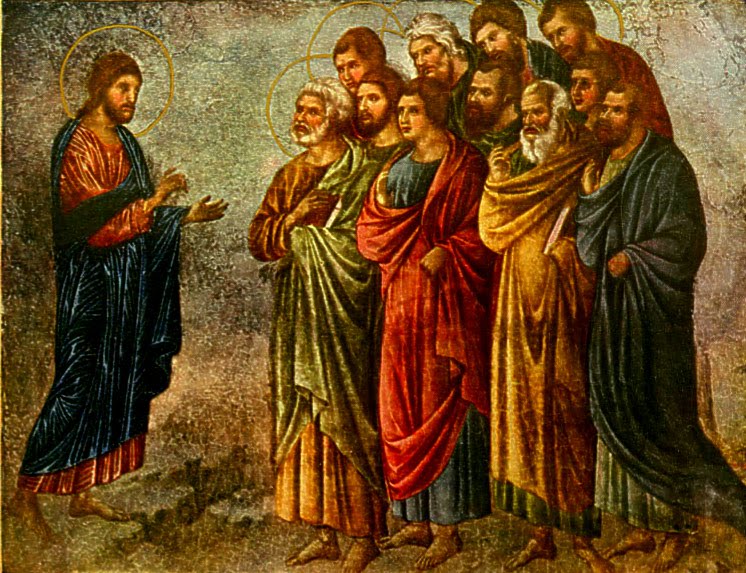a sermon for the fourth Sunday after Pentecost [Proper 8A/Lectionary 13]
Matthew 10:40-42
We hear in today’s gospel lesson the final part of Jesus’ instruction to his disciples as he sends them out into the world to do and speak the work of God’s kingdom. For the past two Sundays we’ve heard the earlier parts of his instruction, and, to be honest, they’ve been a bit hard to swallow. He’s told them they will be sent like sheep into the midst of wolves. That doesn’t sound too fun. He’s told them that what they say and do will cause division and confrontation, even among their friends and family. That, also, doesn’t sound like a walk in the park.

Today, however, he ends on a bit of a high note. I imagine that’s a good thing, because many of them are probably wondering what on earth they signed up for. He tells them, “Whoever welcomes you welcomes me, and whoever welcomes me welcomes the one who sent me.” And just like that, Jesus places their presence in the world—their actions, their faith, their ministry—on the same level as God.
It makes me think of my wife’s final words to our daughters from the front porch every morning that they have left for the bus stop to go to school. After the bookbags have been situated on their backs, the proper musical instrument placed in their hand, after the last hugs and kisses, and they’re making their way across the yard, Melinda chimes out, “Make good choices!” They already know they are loved, for sure, but I suppose Melinda wants the last thing that rings in their ear to be something that might guide their actions, a reminder that they have power and agency and responsibility in the day ahead. “Make good choices!” is what should ring in their ears as they get on that bus. And, so far—I’m happy to say—it seems to be working.

So it is with Jesus, standing on the front porch there. Just when they may have started to think they’d been given thankless tasks, just when they are starting to tighten those sandal laces and the belt around their waist and wonder if it will be worth it Jesus assures them that they will be doing God’s very work. They shouldn’t just regard themselves as Jesus’ representatives, but as if they were Jesus himself, and since Jesus is himself on par with the Father, then they would be welcomed as God should be. It sounds a little crazy, but it makes sense, because Jesus’ followers understand themselves to be Jesus’ body. And those who would receive them well would receive the reward of hosting God himself. All this would certainly make me think about my decisions and responsibilities and the choices I’d make. What about you?
It is helpful and encouraging on some level to think that Jesus’ words place me and you, as his disciples, on par with God’s own actions. It certainly puts some pressure on those who may receive us when we go there in the name of Jesus. But the reality is that followers of Christ operate from a very different standpoint today. We’re have to turn this around in our heads a bit. In Jesus’ day, there were no church buildings. The message of Jesus was spread by followers who were itinerant; that is, moving from town to town and house to house. They may have operated in proximity to synagogues for some time, which were buildings, but for many decades the church really didn’t have stationary structures where ministry was based. They spread the word by visiting new cities and new homes and hoping they’d be find a good reception there.
Jesus spoke to his followers about others welcoming them. We tend to think more about how we welcome others among us. Jesus was sending people out, seeing the church on foot, a traveling group. We more often think about people coming to us, seeing the church in a specific place. Of course, we still represent Christ everywhere we go. And in many ways the church of the future, especially in our culture, will need to reclaim this missionary spirit and venture more boldly into the world—boarding those busses, so to speak—sharing our faith with those we meet.

But now it would seem we also must think of how we receive people, how are our congregations places of peace and forgiveness. This work of hospitality, of welcoming and being welcomed—of starting off as strangers to each other and then becoming friends—is the kind of the core of the church’s reality, isn’t it? It’s being at the border between God’s care and the world’s chaos, the unknown wilderness and the Promised Land, the threshold where grace greets each person. Seeing those spaces and this work as holy ground is crucial to what we do.
In ancient societies, hospitality was a life or death matter. Harsh desert environments were threatening to human life, and so one cold cup of water could make all the difference in the world. Offering someone something to drink wasn’t just a nice, friendly gesture. It literally meant you valued their life, you wanted their life to continue. Nowadays it might just be one smile. Or one holding of a door. These interactions are where Jesus’ love and mercy get rooted and grow.
How is the church presenting itself in the world? Are we going as Christ himself goes, leading with our vulnerability and humility, asking others for a cup of water with the hopes conversations may ensue? Or do we more often barrel in, like a bull in a china shop, demanding attention, expecting people to get on board? “Whoever welcomes you welcomes me,” Jesus reminds us. Jesus wasn’t always welcomed, of course, and one important time when he did ask for a cup of water he was given sour wine. Those boundary zones of welcome, the spaces between the wilderness of the world and the haven of God’s grace can be daunting, but it is where new and profound relationships are made and communities are reborn.

As many of you know, our congregation recently completed a very extensive expansion and renovation project. One of the main objectives of that project was to create more space that would enhance our ability to welcome and receive people. If we take Jesus at his word this morning, we would understand that the most significant interaction that will happen in our church building will not happen in the sanctuary, but here, in this space. This is our newly designed welcome desk, on wheels so it can be conveniently moved and with a lower top so as to look less imposing.
The architect who designed this space, a Christ-follower who attends another Richmond congregation, included as many windows as possible in this gathering area. A couple of years ago, when he was presenting his plans, he explained that this decision to use so many windows had less to do with the beauty of natural light and more to do with what it communicates about the church and Christian faith. As we move into the future It was his strong belief that the church must communicate openness and transparency in any way it can. Churches that look like fortresses, with thick walls and small windows, may be beautiful, but they suggest secrecy and an inward feel, like only certain people may come in.
Our new area is so open that people driving up Monument Avenue on Sunday mornings will be able to see us in here. It may seem like a fishbowl, but Jesus’ life was a fishbowl, remember. He commissions his disciples to a life of sharing and openness, of being humble enough to venture into the neighborhood with a hand outstretched for water. We are the vulnerable ones now, for a spell, but God is protecting and watching over us, and we take heart that in Christlike humility there is victory.
We’ve been giving tours of this new space over the past two weeks. Since it will still be a few more weeks before we can gather in person, we figured people might like an up-close view of what has changed. And a lot has changed. Overall people’s reactions are one of surprise and delight and amazement. The reconfiguration of space is so different, in fact, that many people can’t remember where the old front doors used to be. There is one chandelier that catches everyone’s attention, but it’s actually been hanging from the same spot since 1992. It’s not new, but the new design refocuses people’s eyes and makes people notice it for the first time. Maybe that’s how we’ll be with people, too. We’ll notice ones who often get overlooked.
More than one person has noticed something we didn’t intend. It is a large crack on the floor in the newly poured concrete. It happened the day after they poured it several months ago, and the contractor said that’s a common problem with concrete floors. They crack right away.
It’s nothing to be worried about. In most cases you never see the cracks because you quickly cover it with carpet or tile. But we have opted for exposed concrete floors, so there it is. I doubt when the room is full of people that anyone will notice it.
And yet, one person had keen insight when he saw the crack. He said, kind of tongue in cheek, that it sends the message to all who enter here that we’re not perfect. It is a feature of our brokenness right out here in the open, in the threshold where stranger meets friend, where member will meet guest—a few feet away from where a cup of cold water would be given to someone—or because we’re Lutheran, a cup of hot coffee.
I think he’s onto something. The cracks of our sin are real and we can’t cover over them. But Jesus has welcomed us just the same. We are here because of his grace, no matter our race, our economic background, our ethnic origin, our gender, our sexual orientation, no matter how long we’ve been searching for God or how long he’s been our BFF. We are here because of God’s grace. And we’re here not because we’re so deserving of it, but because God has sent his Son to welcome us, to spread out his hands with a hospitality so expansive we’ll never fully understand it. His good choice is for us.
And the brokenness is healed and the divisions are brought together and strangers turn into friends and lives overlap and people see God in one another because whoever welcomes you welcomes Christ and whoever welcomes Christ welcomes the one who sent him.
That’s what you call a welcome that is also reward at the same time. A reward of grace that can never ever be lost.

Thanks be to God!
The Reverend Phillip W. Martin, Jr.










